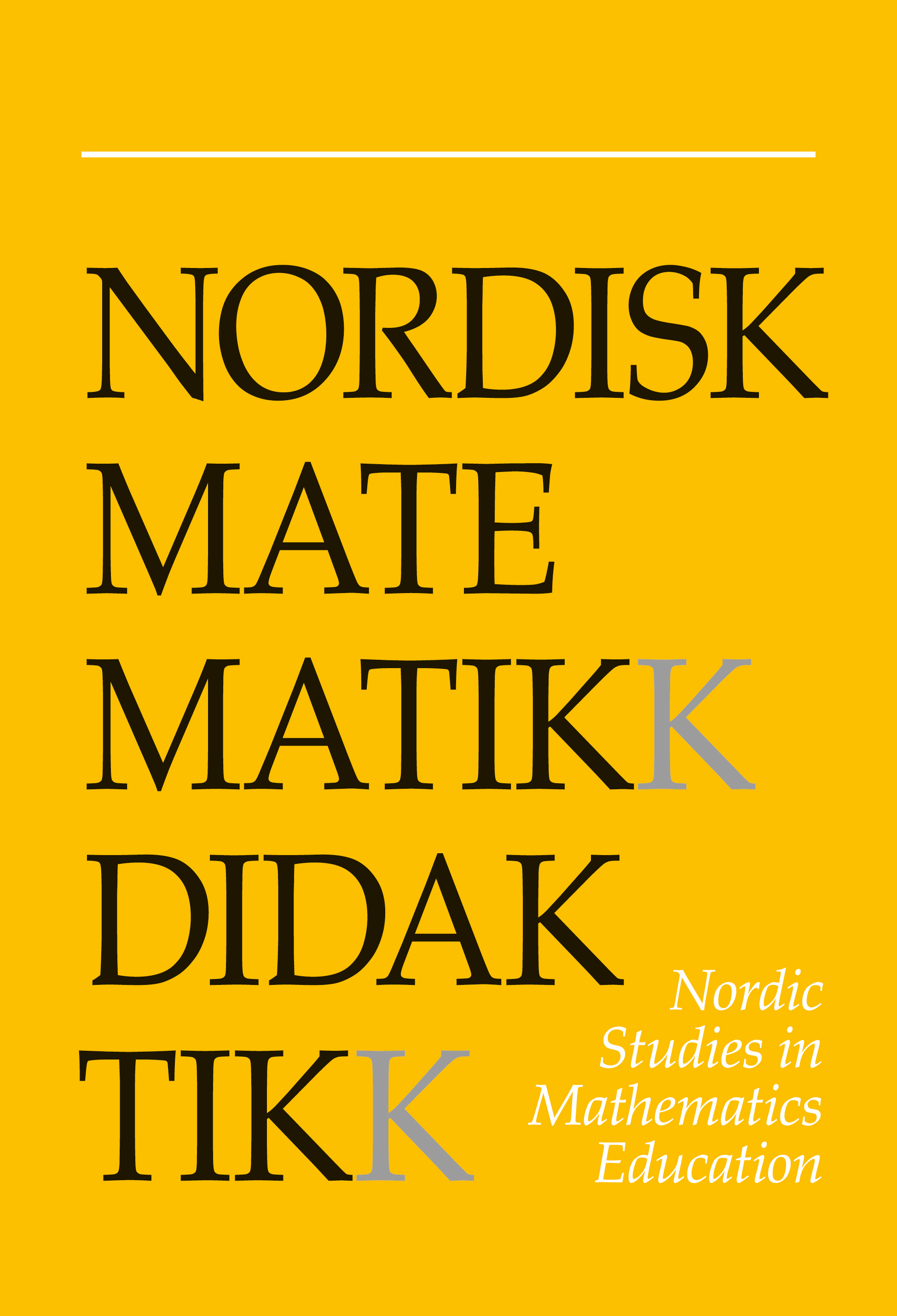A review of the impact of formative assessment on student achievement in mathematics
DOI:
https://doi.org/10.7146/nomad.v22i3.148889Abstract
Research reviews show that formative assessment has great potential for raising student achievement in general, but there is a need for reviews of formative assessment in individual subjects. This review examines its impact on student achievement in mathematics through an assessment of scientific journal articles published between 2005 and 2014 and indexed in Web of science. Through the use of search terms such as ”formative assessment”, ”assessment for learning” and ”self-regulated learning”, different approaches to formative assessment were included in the review. While varying in approach, they all share the defining characteristic of formative assessment: agents in the classroom collect evidence of student learning and, based on this information, adjust their teaching and/or learning. The results show positive relations between student achievement in mathematics and the ways of doing formative assessment included in the review.
References
Andersson, C. & Palm, T. (2017). The impact of formative assessment on student achievement: a study of the effects of changes to classroom practice after a comprehensive professional development programme. Learning and Instruction, 49, 92-102. https://doi.org/10.1016/j.learninstruc.2016.12.006
Bennett, R. (2011). Formative assessment: a critical review. Assessment in Education: Principles, Policy & Practice, 18 (1), 5-25. https://doi.org/10.1080/0969594X.2010.513678
Black, P. & Wiliam, D. (1998a). Assessment and classroom learning. Assessment in Education: Principles, Policy & Practice, 5 (1), 7-74. https://doi.org/10.1080/0969595980050102
Black, P. & Wiliam, D. (1998b). Inside the black box: raising standards through classroom assessment. The Phi Delta Kappan, 80 (2), 139-148.
Black, P. & Wiliam, D. (2009). Developing the theory of formative assessment. Educational Assessment, Evaluation and Accountability, 21 (1), 5-31. https://doi.org/10.1007/s11092-008-9068-5
Cohen, J. (1988). Statistical power analysis for the behavioral sciences (2nd ed.). Hillsdale: Lawrence Erlabaum Associates.
Dignath, C. & Büttner, G. (2008). Components of fostering self- regulated learning among students. A meta-analysis on intervention studies at primary and secondary school level. Metacognition and Learning, 3 (3), 231- 264. https://doi.org/10.1007/s11409-008-9029-x
Dunn, K. & Mulvenon, S. (2009). A critical review of research on formative assessment: the limited scientific evidence of the impact of formative assessment in education. Practical Assessment, Research & Evaluation, 14 (7).
Gough, D., Oliver, S. & Thomas, J. (2013). Learning from research: systematic reviews for informing policy decisions. London: University of London EPPI- Centre.
Hattie, J. (2009). Visible learning: a synthesis of over 800 meta-analyses relating to achievement. London: Routledge.
Hattie, J. & Timperley, H. (2007). The power of feedback. Review of Educational Research, 77 (1), 81-112. https://doi.org/10.3102/003465430298487
Hodgen, J. & Marshall, B. (2005). Assessment for learning in English and mathematics: a comparison. Curriculum Journal, 16 (2), 153-176. https://doi.org/10.1080/09585170500135954
Kingston, N. & Nash, B. (2011). Formative assessment: a meta-analysis and a call for research. Educational Measurement: Issues and Practice, 30 (4), 28-37. https://doi.org/10.1111/j.1745-3992.2011.00220.x
Kluger, A. & DeNisi, A. (1996). The effects of feedback interventions on performance: a historical review, a meta-analysis, and a preliminary feedback intervention theory. Psychological Bulletin, 119 (2), 254-284. https://doi.org/10.1037/0033-2909.119.2.254
National Mathematics Advisory Panel. (2008). Chapter 6: report of the Task group on instructional practices. Retrieved from http://www.ed.gov/about/bdscomm/list/mathpanel/report/instructional-practices.pdf
Panadero, E. & Jönsson, A. (2013). The use of scoring rubrics for formative assessment purposes revisited: a review. Educational Research Review, (9), 129-144. https://doi.org/10.1016/j.edurev.2013.01.002
Rakoczy, K., Klieme, E., Burgermeister, A. & Harks, B. (2008). The interplay between student evaluation and instruction - grading and feedback in mathematics classrooms. Zeitschrift Fur Psychologie-Journal of Psychology, 216 (2), 111-124. https://doi.org/10.1027/0044-3409.216.2.111
Rohrbeck, C.A., Ginsburg-Block, M.D., Fantuzzo, J.W. & Miller, T.R. (2003). Peer-assisted learning interventions with elementary school studies: a meta- analytic review. Journal of Educational Psychology, 95 (2), 240-257. https://doi.org/10.1037/0022-0663.95.2.240
Ross, J. (2006). The reliability, validity, and utility of self-assessment. Practical Assessment, Research & Evaluation, 11 (10), 1-13. Retrieved from http:// pareonline.net/getvn.asp?v=11&n=10
Ryve, A., Nilsson, P., Palm, T., Steenbrugge, H. van, Andersson, C. et al. (2015). Kartläggning av forskning om formativ bedömning, klassrumsundervisning och läromedel i matematik. Stockholm: Vetenskapsrådet.
Shute, V. (2008). Focus on formative feedback. Review of Educational Research, 78 (1), 153-189. https://doi.org/10.3102/0034654307313795
Wiliam, D., Lee, C., Harrison, C. & Black, P. (2004). Teachers developing assessment for learning: impact on student achievement. Assessment in Education Principles Policy and Practice, 11 (1): 49-65. https://doi.org/10.1080/0969594042000208994
Wiliam, D. & Thompson, M. (2008). Integrating assessment with learning: What will it take to make it work? In C. A. Dwyer (Ed.), The future of assessment: shaping teaching and learning (pp. 53-82). Mahwah: Lawrence Erlbaum Associates. https://doi.org/10.4324/9781315086545-3
Yeh, S. (2009). Class size reduction or rapid formative assessment? A comparison of cost-effectiveness. Educational Research Review, 4 (1), 7-15. https://doi.org/10.1016/j.edurev.2008.09.001
Zimmerman, B. (2001). Theories of self-regulated learning and academic achievement: an overview and analysis. In B. Zimmerman & D. Schunk (Eds.), Self-regulated learning and academic achievement: theoretical perspectives (pp. 1-37). Mahwah: Erlbaum. https://doi.org/10.1007/978-1-4612-3618-4_1
Zimmerman, B. (2002). Becoming a self-regulated learner. An overview. Theory Into Practice, 41 (2), 64-70. https://doi.org/10.1207/s15430421tip4102_2
Zimmerman, B. & Bandura, A. (1994). Impact of self-regulatory influences on writing course attainment. American Educational Research Journal, 31 (4), 845-862. https://doi.org/10.3102/00028312031004845
Downloads
Published
How to Cite
Issue
Section
License

This work is licensed under a Creative Commons Attribution-NonCommercial-ShareAlike 4.0 International License.



